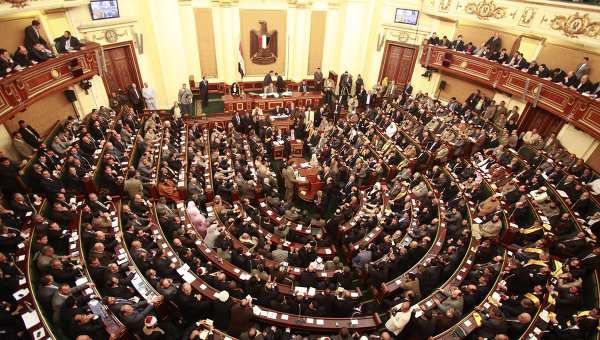
The Supreme Constitutional Court released a statement on Monday condemning President Mohamed Morsy’s presidential decree to reinstate the People’s Assembly while simultaneously reaffirming the ‘binding’ nature of their previous decision to dissolve the legislative body.
The statement was a response to Morsy’s move which began the legal battle over the powers and constitutionality of both the judiciary and executive branches of government. Morsy’s decision seems more focused at the Supreme Council of Armed Forces who signed off on the dissolution of parliament before he was elected in what was considered by many analysts as ‘soft coup.’Morsy’s decision elicited immediate rebuke from several lawyers and constitutional experts who believe he overstepped the law. However, several politicians, notably the Islamists members of the dissolved parliament, were eager to resume work. The SCC’s general assembly said its decision was final and it was similarly reviewing lawsuits filed against the president’s move today.
“The Supreme Constitutional Court’s decisions are binding to all institutions of state,” said the statement which came after a meeting of the court’s general assembly. The statement came after Morsy issued a decree yesterday calling for the People’s Assembly to convene and cancelled the decision to dissolve the assembly.
“The Supreme Constitutional Court will continue to assume its duties as outlined in the constitution, the main duty of which is to act as the only judicial oversight on the constitutionality of laws. The court’s laws state that its verdicts are final and cannot be appealed, and that these verdicts are binding to all institutions of state and all persons,” said the statement.
According to the statement, several citizens and political figures have filed cases against the president’s decision with the court, arguing Morsy usurped the official court ruling and the law, a power he does not have. “Some of the plaintiffs have called for the immediate stopping of the president’s decision and the continuation of applying the court’s ruling,” it said.
The statement concluded with the court declaring that it would address these cases itself as soon as possible.
“The court itself is only body with the right to handle cases related to the application of its verdicts, and as per the law, the court will review the cases calling for the execution of its verdict in a legal manner,” the statement read.
In response to the court’s statement, Acting Presidential Spokesperson Yasser Aly told official state news agency MENA on Monday the president’s decision does not challenge the SCC’s decision, but rather sets up a time frame to implement the court’s ruling.
“President Morsy’s decision came in order to implement the Supreme Constitutional Court’s decision,” Aly said.
Aly explained that Morsy only reversed a decision made by the Supreme Council of Armed Forces in its capacity as acting president before his election, and that he did not reverse the court’s verdict.
“The decision provides a time frame for the implementation of the court’s verdict and there is historical and constitutional precedent of legislative assemblies being dissolved in accordance with a certain time frame rather than immediately,” Aly said.
Aly wanted to make it clear that there was no animosity between the presidency and the judiciary.
“This statement is atrocious and shows that members of the Supreme Constitutional Court are not aware of the limits of their powers,” Cairo University constitutional law professor Tharwat Badawi told Daily News Egypt.
He added that it is unacceptable for the court to get involved in disputes between public or private political forces.“The Supreme Constitutional Court has very specific tasks. A judge should refrain from giving statements or legal opinions to the media seeing as they are meant to make objective rulings and must be above such things,” Badawi said.
“The Supreme Constitutional Court’s role is constitutional oversight over laws, and even then it only rules on whether or not a law is constitutional upon it being referred to it by another court, be it criminal, civil or administrative. It cannot decide on what the consequences of a law being unconstitutional are, that is the original court’s prerogative,” he added.
Badawi elaborated by saying that the SCC is meant to act as a body of experts on the constitutionality of legislation but not a decision-making body. Its decisions are binding only as to whether or not the law is constitutional, but it may not take specific actions like dissolving a chamber of parliament.
“We are now living a disaster. Courts are not meant to ask citizens to file cases, they only issue verdicts. This will lead to judges losing their credibility,” Badawi said.The Supreme Council of Judiciary has also released a statement on Monday night stating it was also studying the president’s decision and its consequences.
“Since this matter is highly related to the affairs of the judiciary, the council is currently studying the consequences and implications of this decision from all sides and aspects, and will make its decision at the appropriate time,” the statement read.

